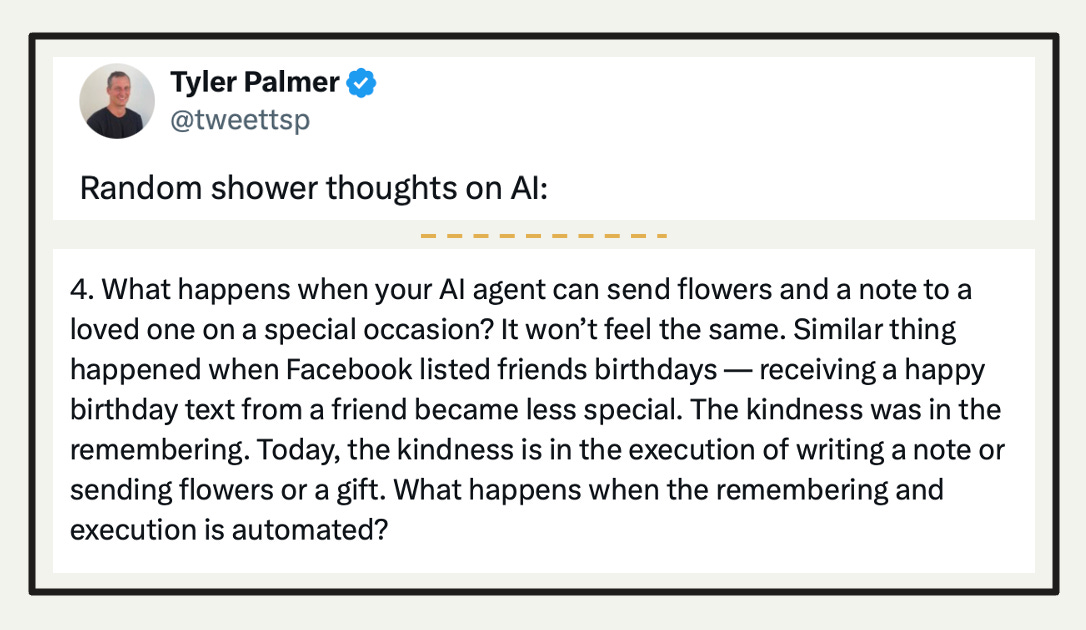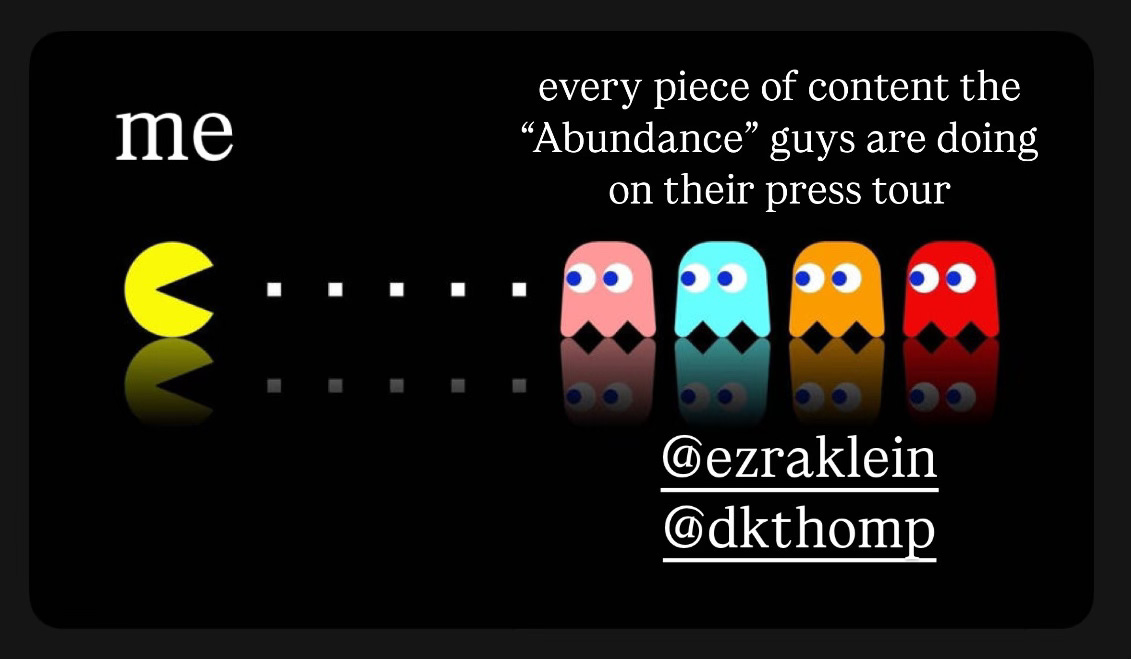004 - The Inefficiency Is The Point
In an increasingly automated world, what value does humanity have?
The batting order (the list?) (the rundown?)
My dear friend Tyler Palmer always posts good shit. His tweet earlier in the week got me thinking, as his tweets usually do. It inspired this piece.
You know who’s not dunking his face in a bowl of iced Saratoga water? Jeff Bezos. “I get up and I kind of putter…”. This is the way.
And we’re off…
We're living through a golden age of optimization and efficiency.
My phone has my dinner reservation, and alerts me the second I should leave based on real-time subway schedules and updates. My shades open - automatically - at 6:45am, and the lights in my house turn on exactly 30 minutes before sunset every single evening that I am at home. I wear a device on my wrist that measures exactly how "ready" my body is, physically, and alerts me to the precise amount of exercise and movement needed to optimally meet my fitness goals.
These pieces of technology are human-made miracles that work for us, every day. I love them and I am happy they exist.
But in some very important ways, they have stripped life of its color.
I am a servant to my calendar, yet the days I love the most - the days that created memories, and shaped me - are the days I throw it out the window.
And this has made me believe, increasingly, that the most important thing we can do - for our careers, for our mental wellness, and our long-term strategic gain - on any given day, is waste a little time on purpose.
Here’s one for the LinkedIn Freaks:
Poetic inefficiency might be the last place left where real richness hides. It's where a unique and interesting worldviews are formed, and where humanity - real humanity, not productivity - thrives.
The Efficiency Delusion
When asked, almost universally, people say that they value "efficiency" highly. Americans rank "efficiency" at parity with family, pets, and sleep as fundamental priorities. One of the last things we all pretend to agree on.
And I think - when it comes to our “love” of efficiency at least - we're all full of shit.
In a tweet from a few weeks ago, my friend Tyler posed a question that stuck with me:

I don't think people actually want efficiency. They like the idea of it. They enjoy having a supercomputer in their pocket. They feel cool when the lights come on automatically.
But I believe many would sacrifice all of that for more of the simple things whose inefficiency makes them special.
Care. Warmth. Surprise. Empathy. Suspense. Falling In Love.
These things are special because they take time, thought, and effort. They matter because there is the risk of failure, and - importantly - because they involve other people.
Efficiency minimizes unpredictability, but unpredictability is the spice of life.
Optimization Addiction
The sick addiction is everywhere you look.
The Nasdaq recently announced it will move to (essentially) 24 hour trading by 2026. Will Rhind, CEO of GraniteShares, a global investment firm, sees it as inevitable: "A lot of investors have learned from the crypto world that now, if you've got access to an iPhone, you can be trading cryptocurrencies 24/7 anywhere in the world…" he told CNBC.
I'm sure this will no doubt result in happier, more evolved, more well-adjusted 23-year-old vest-wearing analysts.
I remember exactly where I was when I first heard an executive use the term "operational efficiency." Another exec leaned over to me in the board room and whispered "that means layoffs…"
You can't go a few paragraphs without seeing quotes from business leaders talking about all of the "efficiencies" that AI will bring to the workplace, and all of the shareholder value that will be extracted (or created, depending on your POV).
But efficiency as a highest order flies in the face good leadership and strong employer culture.
The Devil’s Bargain of this efficiency optimization is that it comes at the cost of something even more essential.
How To Build The World We Actually Want
The world we desire is not a world where efficiency is primary.
A world where I am my brother's keeper is not a world where efficiency is primary. Anyone who has worked in corporate America knows this.
A world where great stories are written and moving works of art are created is not a world where efficiency is primary. Anyone who has been on a production knows this.
A world where children are raised with empathy and elders are cared for with dignity is not a world of efficiency. Anyone who has loved deeply or grieved slowly knows this.
Inefficiency remains the last unclaimed territory where genuine human value resides. Where authentic perspectives develop and true memories are made.
Consider a practical example: I live in New York City, and - more or less - have two routes home from my office in Soho to my home in FiDi.
Option A: The A/C Line of the NYC Subway. 1.5 miles, about 17-22 minutes depending on how cooperative NYC MTA is.
Option B: Walking. An identical 1.5 miles, but about 30-35 minutes (or 55-63% longer in efficiency terms). The time difference is modest, but the experience gap is substantial.
Sitting underground, I might finish a third of a podcast episode or doom-scroll. I might get home to my wife and my dog 10 minutes faster. Within a half hour door to door I could be in sweats watching Netflix.
Walking above ground there are dozens of art galleries, restaurants, bars, and shops along that route that I could venture into. There are conversations waiting to be overheard that will spark new ideas, or strangers to meet that might change the way I see things.
These moments aren't efficient. They are the direct result of choosing inefficiency.
And I argue this isn't merely a romantic lifestyle philosophy. The highest-value elements of human experience don't scale. They resist optimization by definition.
So this becomes a strategic advantage for an age of diminishing returns. These inefficient choices make you, human, you…
If we outsource everything to efficiency-optimized systems - AI summaries, algorithmic recommendations, standardized workflows - we risk a cognitive monoculture that is as useless as it is cold. A landscape where everyone accesses identical insights, framed identically, from identical tools.
Our last defense against this cold and overly structured world are moments of beautiful inefficiency that color the prism through which we understand data, these tools, and the world we share.
Machines don’t take the scenic route. But we can.
The Action Plan
Here's the actionable insight for you LinkedIn Freaks:
Be inefficient, deliberately. Every day. Do it on purpose. Think harder, longer. Try one more iteration. Be three minutes late to the meeting because you were talking to a co-worker. Read a book. Walk. Be bored. Send a handwritten letter. Call your mom.
Strategic inefficiency is the answer to transcending algorithmic averages. It's how you maintain originality, perspective, and competitive differentiation.
And in a marketplace relentlessly trending toward uniformity, that might be the only edge worth having.
-JMO


